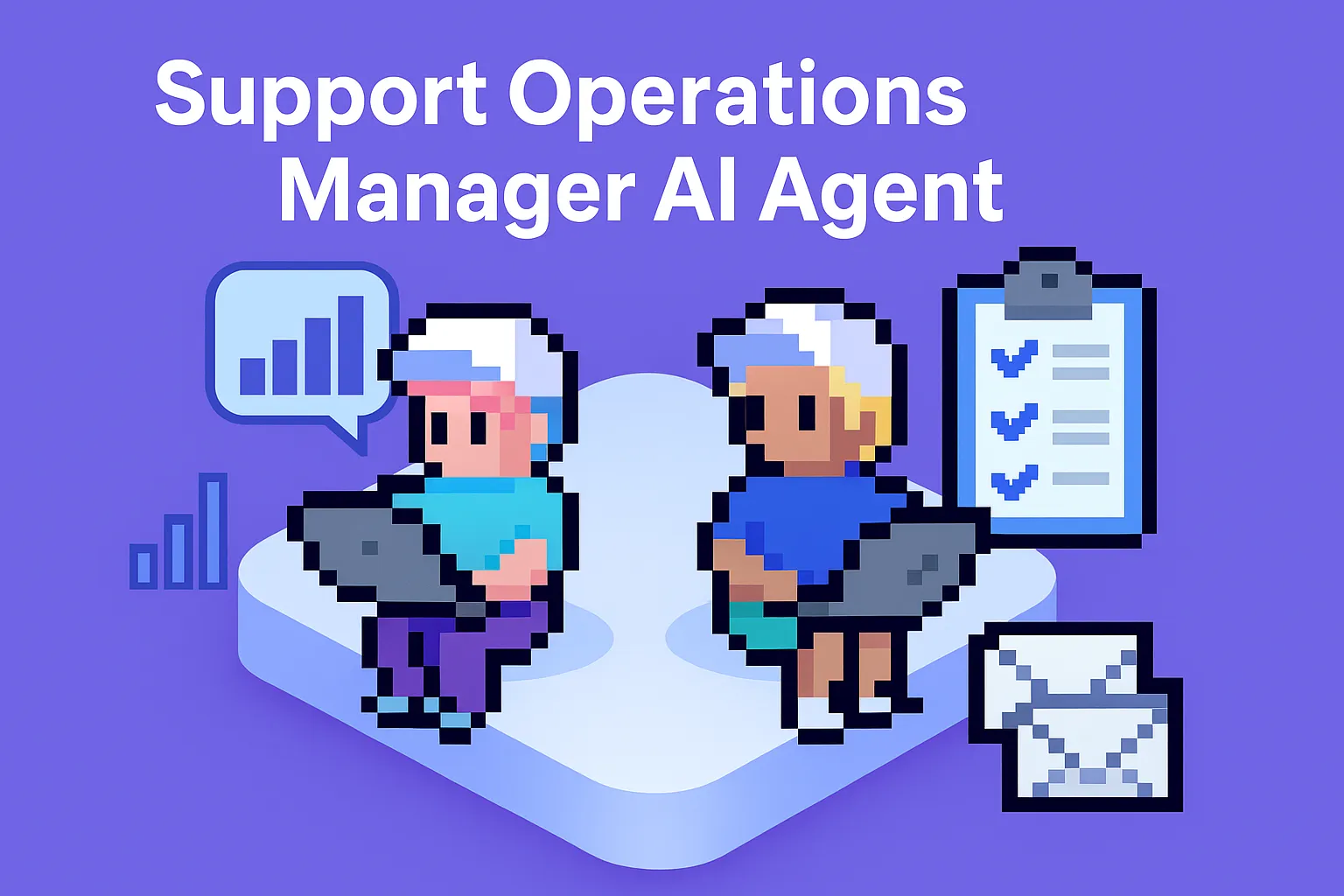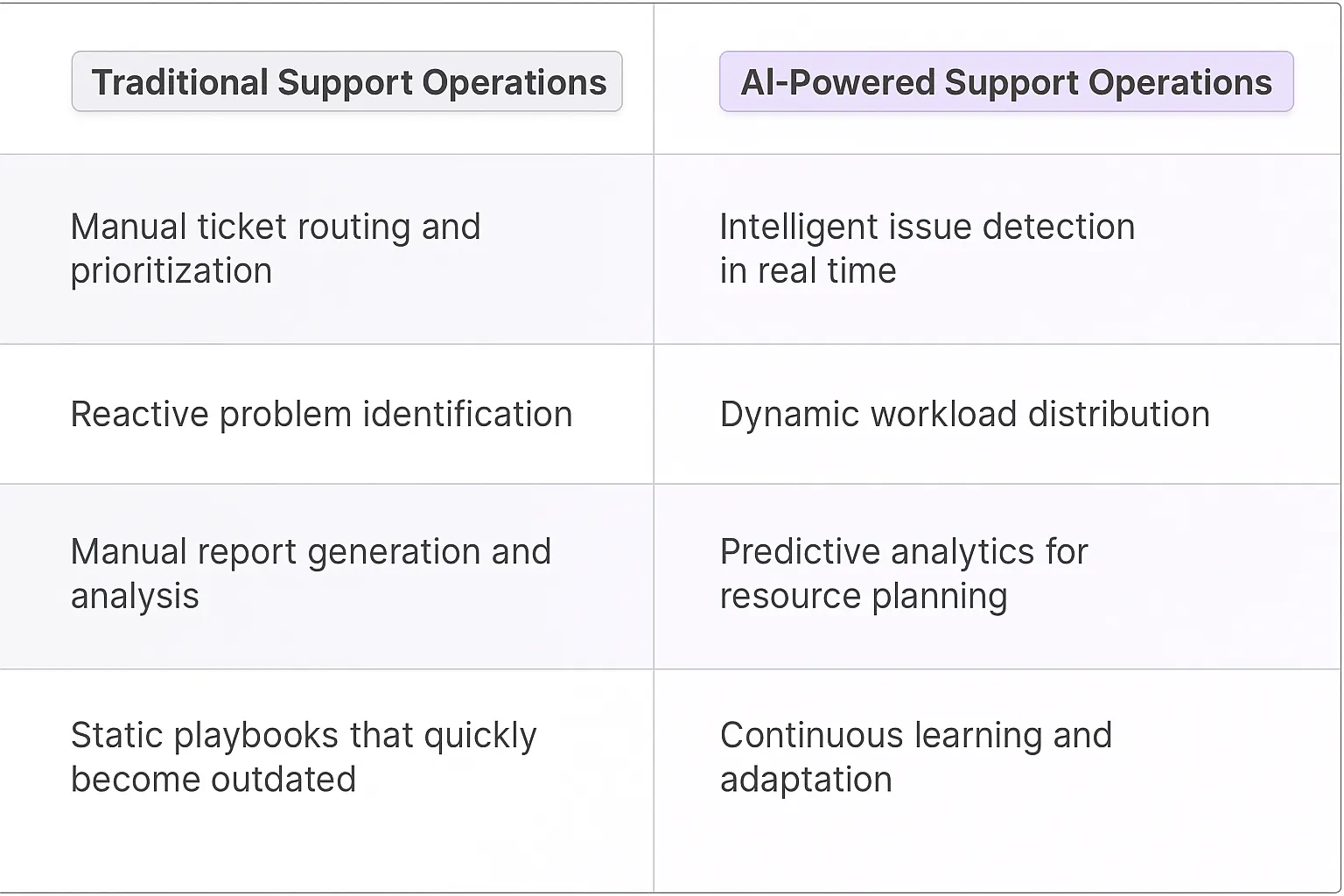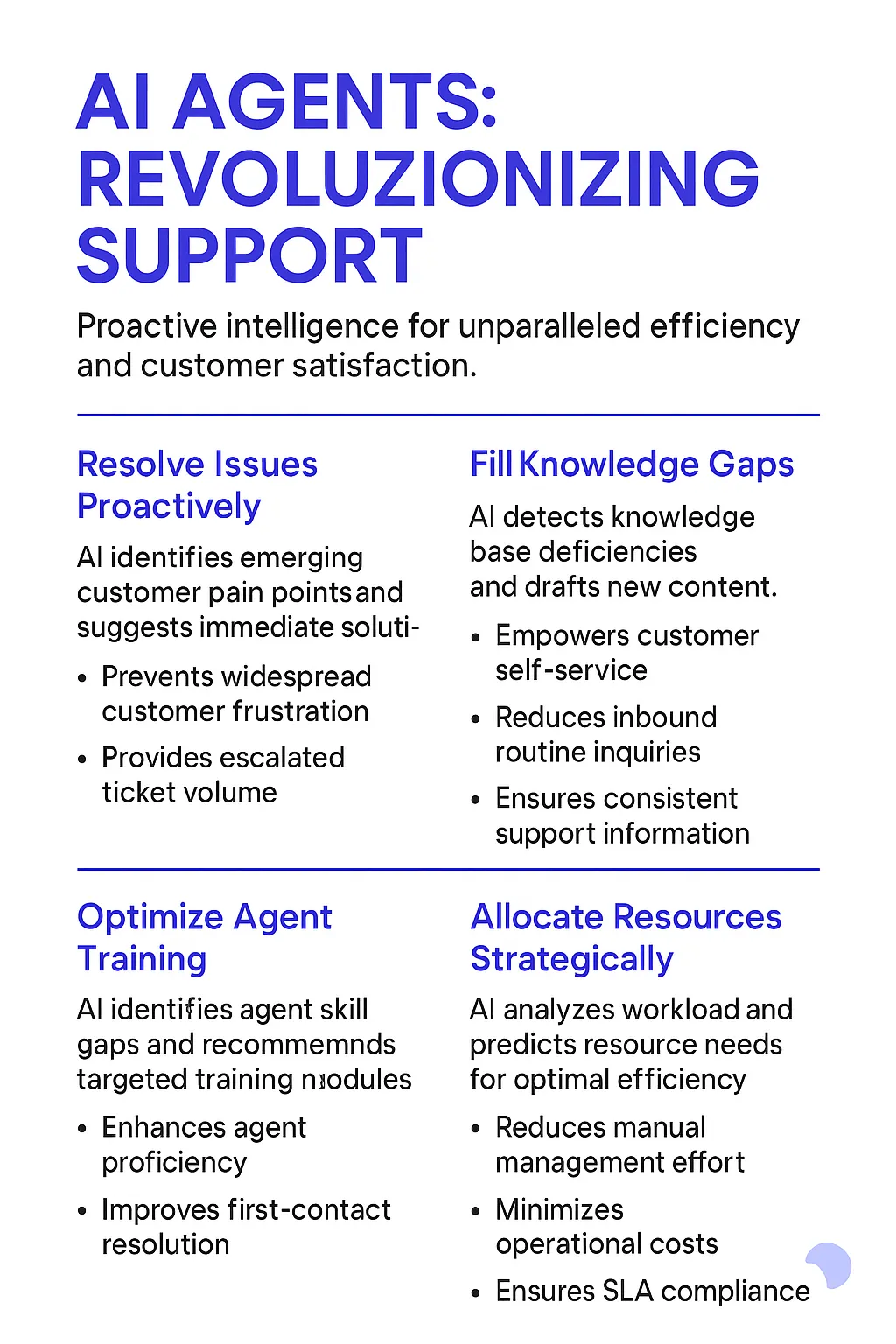Support Operations Manager is a sophisticated AI-powered system that acts as a digital teammate in managing complex support operations. It goes beyond basic automation by actively participating in decision-making processes, analyzing support patterns, and providing data-driven recommendations. The system continuously learns from interactions, adapting to your team's unique workflows and challenges while maintaining high standards of service delivery.

Support operations traditionally relied on a complex web of manual processes, spreadsheets, and disconnected tools. Support managers spent countless hours triaging tickets, manually routing issues, and diving into data to spot emerging problems. They'd piece together insights from various dashboards, hoping to catch critical patterns before they escalated into major incidents.
The standard toolkit included:
AI Agents fundamentally transform support operations by bringing intelligence and automation to previously manual processes. The impact is profound and measurable:
The most compelling aspect is how AI Agents serve as force multipliers for support managers. They handle the heavy lifting of data analysis and routine decision-making, freeing managers to focus on strategic initiatives and team development. This shift from reactive to proactive management represents a fundamental evolution in support operations.

Support operations is experiencing a fundamental shift. Digital teammates are becoming integral members of support teams, handling the heavy lifting of data analysis and process optimization. They're not just tools - they're becoming strategic partners in delivering exceptional customer support.
The most interesting pattern I'm seeing is how these AI agents are creating feedback loops between customer interactions and operational improvements. When a support team deploys an AI agent for ticket analysis, they're not just getting data - they're getting actionable insights that continuously refine their support strategy.
What makes this particularly powerful is the compound effect. Each interaction makes the system smarter, leading to better predictions, more accurate categorizations, and more relevant suggestions. Support teams that embrace these digital teammates aren't just keeping up - they're building exponential advantages in customer satisfaction and operational efficiency.
The teams winning at this are the ones treating their AI agents as capability multipliers rather than simple automation tools. They're using them to enhance human judgment and creativity, not replace it. This is where the real transformation in support operations is happening.

The versatility of AI agents in Support Operations Management creates transformative opportunities across multiple sectors. Support teams face increasingly complex challenges - from managing high-volume customer inquiries to maintaining quality standards at scale. Let's dive into specific examples where AI agents are making a tangible impact.
What's particularly fascinating is how these digital teammates adapt to different support environments. They're not just handling routine tasks - they're actively participating in complex support operations, learning from interactions, and helping teams deliver more personalized customer experiences. The real power lies in their ability to augment human capabilities rather than replace them.
When we look at the data from early adopters, we're seeing patterns that suggest a fundamental shift in how support operations are structured. Teams using AI agents are reporting significant improvements in response times, resolution rates, and team satisfaction. This isn't just incremental improvement - it's a step-function change in support operations capability.
When I talk to e-commerce founders, their support operations consistently emerge as one of the most complex, resource-intensive aspects of scaling. A Support Operations Manager AI Agent transforms this landscape by functioning as a specialized digital teammate that handles the intricate dance of support ticket management, team coordination, and performance optimization.
Take Shopify merchants dealing with seasonal spikes - particularly during Black Friday and holiday rushes. The Support Operations Manager AI Agent monitors incoming ticket volumes in real-time, identifying patterns in customer issues before they become widespread problems. When a new product launch triggers an unexpected surge in sizing questions, the agent automatically routes these tickets to specialists while flagging the trend to product teams.
The agent's ability to analyze support metrics reveals hidden opportunities. For instance, it might notice that response times lag between 2-4 PM EST due to team scheduling gaps, then suggest optimal shift adjustments. Or it could identify that certain product categories consistently generate more complex tickets, indicating a need for specialized training or updated documentation.
What's particularly powerful is how the agent adapts to your specific support workflow. It learns your team's strengths, recognizes which types of issues each agent handles most effectively, and dynamically adjusts routing rules to maximize resolution speed while preventing burnout. This level of intelligent operations management used to require multiple senior support leads - now it's handled by one AI agent that never sleeps.
The growth implications are significant: e-commerce companies can maintain high-quality support through 4X volume increases without proportional team expansion. More importantly, they gain a systematic way to turn support interactions into product and operational improvements.
I've spent time with dozens of healthcare providers, and a clear pattern emerges - support operations in healthcare settings are uniquely challenging due to their direct impact on patient outcomes. Support Operations Manager AI Agents are reshaping this critical function by coordinating complex care workflows while maintaining strict HIPAA compliance.
A major hospital network I advise implemented these agents to manage their patient support operations. The AI agent monitors incoming patient inquiries across multiple channels - phone, patient portal, and email - while intelligently categorizing urgent vs. non-urgent cases. When a patient reports post-surgical complications, the agent immediately escalates to the appropriate care team while simultaneously updating relevant medical records.
The agent's pattern recognition capabilities prove invaluable in preventive care. By analyzing thousands of patient interactions, it identifies subtle trends - like an uptick in medication side effect reports - and proactively alerts healthcare providers. This early warning system helps medical teams address potential issues before they become widespread problems.
What fascinates me most is the agent's ability to optimize resource allocation in real-time. During flu season surges, it automatically adjusts triage protocols, redistributes nurse workloads, and triggers additional staffing requests based on predicted patient volumes. The system even factors in historical patient behavior patterns to anticipate peak times for different types of care requests.
The impact metrics tell a compelling story: healthcare providers using these AI agents report 40% faster response times to patient inquiries and a 60% reduction in administrative workload for medical staff. But the real game-changer is how it enables healthcare teams to shift from reactive to proactive patient care management.
Implementing a Support Operations Manager AI agent requires careful navigation of several technical complexities. The agent needs access to multiple data sources - from ticket systems to knowledge bases - while maintaining strict data security protocols. One significant challenge lies in training the model to understand company-specific terminology and support processes without compromising sensitive information.
Teams often struggle with API rate limits and data synchronization issues when the agent needs to pull information from various systems simultaneously. The technical architecture must be robust enough to handle peak support volumes while maintaining response speed and accuracy.
Support staff typically have established workflows built over years of operation. Introducing an AI agent means redesigning these processes thoughtfully. The transition period requires careful management - support staff need time to adapt their workflows while maintaining service quality. Some teams experience initial resistance when certain manual tasks shift to automation.
The effectiveness of a Support Operations Manager agent depends heavily on its training data. Organizations face the challenge of converting tribal knowledge into structured data the AI can understand. This includes documenting unofficial workflows, capturing expert insights, and maintaining up-to-date information as products and services evolve.
Measuring the true impact of the AI agent goes beyond basic metrics like ticket resolution time. Teams need sophisticated monitoring systems to track accuracy, learning rate, and edge cases where the agent needs human intervention. Creating meaningful KPIs that reflect both efficiency gains and quality maintenance proves challenging for many organizations.
Finding the right balance between AI automation and human judgment requires ongoing refinement. Support teams must develop clear escalation paths and decision frameworks for when issues exceed the agent's capabilities. The challenge lies in maintaining human expertise while leveraging AI for routine tasks, ensuring the team doesn't become overly dependent on automation.
While AI agents can reduce operational costs, the initial investment in technology, training, and process redesign can be substantial. Organizations must carefully evaluate the long-term ROI, considering factors like maintenance costs, ongoing training requirements, and the potential need for specialized talent to manage the AI system.
The integration of AI Agents into support operations represents a fundamental shift in how teams deliver customer service. The most successful implementations aren't just about automation - they're about creating intelligent partnerships between human expertise and AI capabilities. Looking ahead, the teams that thrive will be those who master this symbiosis, using AI Agents to amplify their human talents rather than replace them. The data shows this isn't just an incremental improvement - it's a complete transformation in support operations effectiveness.
For support leaders considering this transition, the key is starting with clear objectives and gradually expanding the AI Agent's role as the team adapts. The long-term benefits - from improved customer satisfaction to operational efficiency - make this evolution not just valuable but necessary for staying competitive in modern support operations.